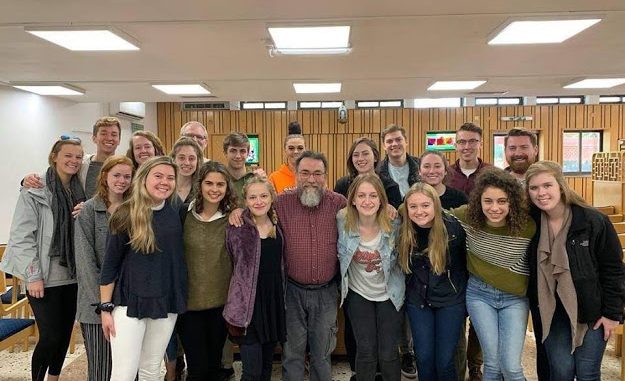
Ardie Geldman is a people person who happens to love Israel. That makes it only natural he’d use his people skills to impart the truth about Israel to visiting groups of tourists who often have a negative view of the Jewish State. Geldman calls his initiative iTalkIsrael, and the work is having an impact even if it’s only to draw attention to the idea that hey: when it comes to Israel, there’s another narrative out there to consider.
At 68, Ardie looks many years younger, and shows no signs of slowing down, so don’t count him out. He’s right in the thick of things on the Israel front, offering straight talk on settlements and Arab terror to often-hostile tourists and students who show up with all kinds of ignorant preconceptions. Anyone else, this author, for instance, would have lost their mind arguing with these people, eons ago. But Ardie keeps on keeping on, using his God-given talents to make a difference for his beloved country, Israel.
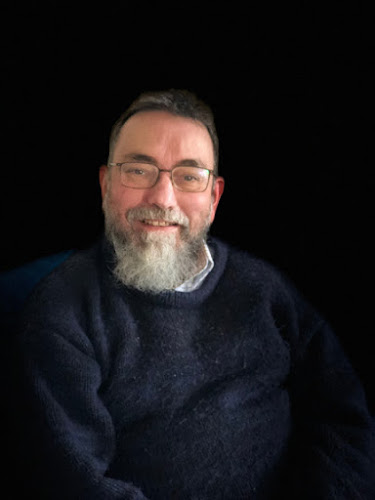 |
| Ardie Geldman |
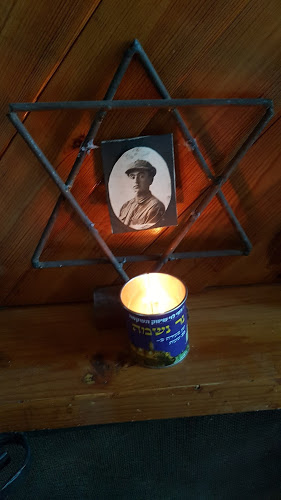 |
| Ardie’s late father, Z”L. “My Zionist Inspiration.” |
Varda Epstein: Can you tell us a bit about yourself, your family, where you’re from, why you made Aliyah?
Ardie Geldman: I was born and raised in Chicago. My mom, z”l, was also born and raised in Chicago. My father, z”l, was born in Bessarabia, later Romania, in a city called Bolghrad, today in Southeast Ukraine. He came to Eretz Yisrael as a chalutz[pioneer V.E.] in 1920 and stayed for about a year, helping to construct the first paved roads in the Galilee near Tiberias.
According to my father’s American visa application his residence in Israel was “HaMashbir Tiberias.” I believe that this was the first HaMashbir enterprise [HaMashbir is a chain of department stores in Israel, V.E.] established under the then newly formed Histadrut [General Organization of Workers in Israel, V.E.]. After contracting and, B”H, recovering from malaria, common then and there, he accepted his aunt’s and uncle’s invitation to come live in America, specifically Milwaukee, WI. My father lived there for a few years but subsequently moved south to Chicago where employment opportunities were better. There he met my mother. I am the result.
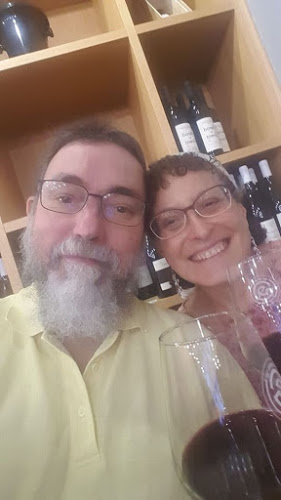 |
| Ardie and Ivonne Geldman |
I am sure that the few stories my father told me about his experiences here, when I was quite young, planted a seed in me that, along with other influences, including the 1960 movie Exodus, contributed to my decision to live my life in Israel. My wife was also born in the States. She came to Israel immediately after high school. While neither of my parents personally experienced the Holocaust, my late father-in-law was a prisoner in a number of concentration camps and lost much of his family at the hands of the Nazis. His experiences, I’m sure, influenced my wife’s Zionism and contributed to her decision to live here.
Both myself and my wife were raised in secular Jewish homes and independently were drawn to a religious-Zionist way of life before we met. We moved to Israel in 1982 and lived in Petach Tikvah for the first three years. We have been living in Efrat since 1985. Here we raised six children and have been blessed, so far, with 10 grandchildren.
Varda Epstein: When did you start italkIsrael and why?
Ardie Geldman: What became iTalkIsrael began with my speaking to media people, Jewish tourists and Jewish organizations that would visit Efrat in the late 1980s and especially in the early 1990s while I was an elected member of the Efrat Town Council. The mayor of Efrat at that time barely spoke English and my flexible work schedule, overseeing sundry community development projects in Israel on behalf of the Jewish Federation of Metropolitan Chicago, allowed me to arrange my time to meet with these groups.
In those days I would say that nine out of ten such Jewish groups were gung-ho about “settlements” like Efrat [Efrat has official town status, but since it is located in Judea, is often condemned as a “settlement,” V.E.], whereas today, representatives of Jewish organizations coming here most often say that we are an “obstacle to peace.” At some point during the 1990s, and I don’t remember exactly when, I believe that my name was shared with a guide that brought to Efrat what turned out to be a non-Jewish, pro-Palestinian group from Australia. I don’t remember much else about this group other than being on the receiving end of hostile questions for the first time; it was like suddenly being kicked in the stomach.
In short, word then got around to these types of groups that there is a “settler” who lives in an “illegal settlement” near Bethlehem who is willing to meet with pro-Palestinian foreigners. For years I did just that, speaking to mostly pro-Palestinian groups in Efrat for 1½ to 2 hours who, with but few exceptions, left with the same jaundiced and deluded views of “settlers” and “settlements” with which they came. It seemed that almost all left with the same scripted non-committal line, “Thank you for your time.” This meant to me that the content of my presentation had fallen upon deaf ears.
iTalkIsrael was created to change that response. It was an initiative that emerged following the experience of three Christian college students, women, who were the only ones that, during a short lecture visit, took me up on my invitation to the entire group to return and spend a traditional Jewish Shabbat with Efrat families. The three had an amazing time and this convinced their program director to include a three-day Shabbat weekend stay in Efrat for some 30 Christian students the following year. This first experience indicated to me that I was onto something and my marketing efforts have led to the participation of additional Christian student programs.
| Christian students listen intently to Efrat resident. |
Varda Epstein: Can you tell me about the demographic of the people you work with?
Ardie Geldman: The demographic is mixed if you overlook the fact that the majority of the groups with whom I meet are mostly Christian. With respect to age the participants range from high-school groups to mature adults. The only groups that spend a full Shabbat weekend (Thursday through Sunday morning) in Efrat are Christian college students. All the others, mostly from the U.S. and Canada, but also from the United Kingdom, Western European countries and Australia (though not to the best of my recollection from either Central or South America or Africa) come only for short, hour-and-a-half lectures.
Some groups represent mainstream “high church,” such as Presbyterians or Methodists, while others are Quakers and Mennonites. Some come from independent congregations that do not belong to any major Christian denomination. However, about a quarter of the groups with whom I meet are secular, self-defined social justice or human rights groups. Among these, especially if they come from the States, is often a sprinkling of (very deluded) Jews. The latter often make a point of letting me know that they are Jews, especially when they stand up and condemn Israel, the IDF, and settlers.
I have to say that I never sensed any antisemitism in any of the Christian college groups; not even a hint. In fact, so many left Efrat saying how much they enjoyed learning about Judaism. Some even said that they would stop using electronics on the Sabbath (Sunday, for them). On the other hand, I did encounter antisemitism from time to time among the groups that came for only a lecture. This happened with a few church groups as well as some so-called “social justice” groups. Three years ago I literally threw out a student group from a major East coast university and did the same two years ago with a group of adults from Belgium.
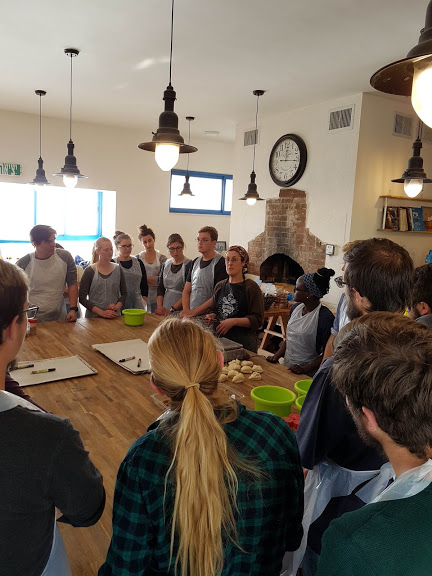 |
| Learning to bake challah bread (challot). |
Varda Epstein: On your website you have a blurb: “Come for a real education.” What does this mean?
Ardie Geldman: It means to be exposed to ideas with which they are unfamiliar, or even opposed, and to a variety of opinions about religion and politics, even within just one Jewish “settler” community. Here is a quote from a recent email I received from a director of one of the participating Christian college programs that reflects the work of iTalkIsrael:
“It’s been so long that we had a decent argument – I genuinely miss coming to Efrat and engaging in the wonderfully hot conversations we had over the years. I consider the times spent with you and Ivonne as one of my top memories during the two decades of bringing students to the Middle East. You have given me a lasting appreciation for Judaism, a deeper respect for Zionism, and both a deeper understanding – as well as a recognition of my own limitations on understanding – of living in Israel in “disputed territory.”
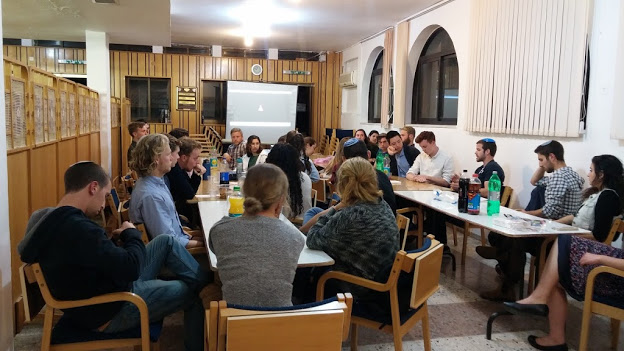 |
| Dialogue with Efrat youth over pizza on a Saturday night. |
Varda Epstein: What is your goal for each group that comes to you, or does that vary from group to group?
Ardie Geldman: For the short visit groups the only objective is to plant a tiny seed of doubt among even just a handful of the visitors about their views of the conflict. Over the years, from time to time, a few people would approach me after I am done speaking while the others are making their way back to the bus and say something like “Thank you so much. We are not hearing any of this.”
The goal for the Shabbat weekend groups is more ambitious. First I’ll tell you what it is not. It is not to transform the visitors into Christian right-wing Zionists. It is to disarm them, to confuse them, to reduce their suspicion and distrust, and even to develop positive, longer-lasting relations with people in Efrat; in short to “humanize the settlers” in their eyes. Based on the obligatory written feedback I receive from each and every participant, I can say that, yes, at least immediately following their “Shabbat in Efrat” experience, this goal is 100% realized.
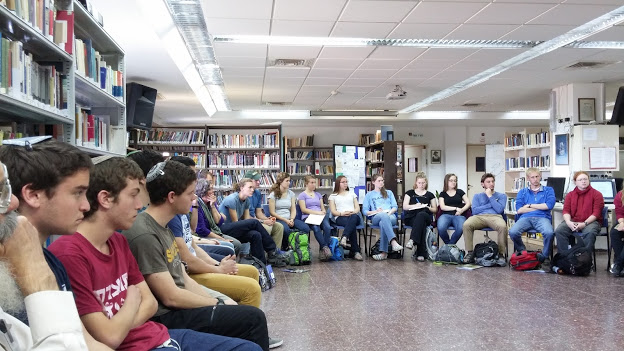 |
| Christian college students dialogue with Efrat yeshiva high school seniors in the Efrat library. |
Varda Epstein: Do you ever correspond with those who hear your lectures, when their trip to Israel is only a memory?
Ardie Geldman: Other than those very few who contacted me not long after their visit because they were writing a term paper and needed some additional information, the general answer is no. The reason for this is interesting. The college programs that come fly under the radar. That is to say, there is an implicit understanding with each program director that their students’ participation in a weekend program in an “illegal settlement” where they are home-hosted by “illegal settlers” remains on the QT.
The directors actually obfuscate this part of their “Israel-Palestine” itinerary from their colleagues and their other program partners in Jordan, Egypt, Turkey, and of course, the Palestinian Authority. I’m not sure how they do it, but I have a feeling that not even all of their superiors in their respective colleges are aware of the Efrat stay. It does not appear on the respective programs’ website, although visiting Israel does.
Two years ago a group almost dropped out after the director became enraged after reading my Commentary piece that mentioned these programs, even though I purposely didn’t identify any of the programs by name nor their schools. In other words, the program directors wish to maximize anonymity and want total control over the students’ ties to the program. Consequently, they do not share their email addresses with me. I would very much have liked to be given their email addresses all these years in order to follow up and see how much of an impact the Efrat experience has on the students in the long run. Having said all of this, some of the participating Efrat host families, at the request of individual students, do maintain email contact with the latter.
Some students, I have been told, have even returned to visit their Efrat hosts on subsequent trips to Israel and “Palestine.” Some students over the years came back for the Purim seudah[feast, V.E.]; others attended a wedding celebrated by their Efrat host family. If you consider where these students’ heads were when they first arrived in Efrat, yes, the “Shabbat in Efrat” program does chalk up some impressive achievements.
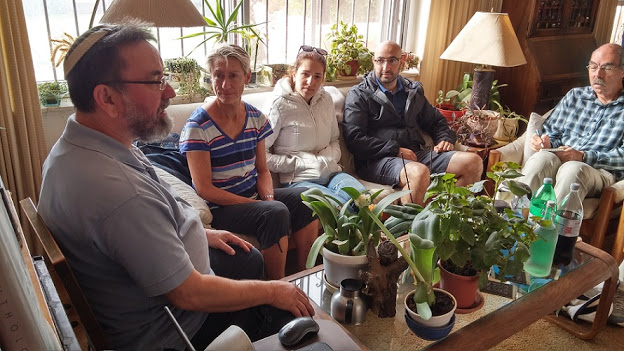 |
| Ardie hosts a small group in his home in Efrat. |
Varda Epstein: If someone spends their entire trip exposed only to the progressive narrative on Israel, is hearing you speak enough to offer balance?
Ardie Geldman: Absolutely not. The cognitive dissonance factor is way, way too strong. The theme under which the short, hour-and-a-half-visit groups operate is “Don’t bother me with facts, my mind is made up.” I believe that to be true for over 90% of those whose visit to Efrat takes place in the midst of a highly propagandized 10-day (on average) tour.
So why do they come? They come because “settlements” are controversial and coming to one is a titillating experience. They come to take notes and photographs that they use in their own pro-Palestinian propaganda work back home. And some come for the opportunity to chastise a settler in person for the evil he represents.
That is why I developed the “Shabbat in Efrat” program. It is based on the principle contained in this Maya Angelou quote: “People will forget what you said, people will forget what you did, but people will never forget how you made them feel.”
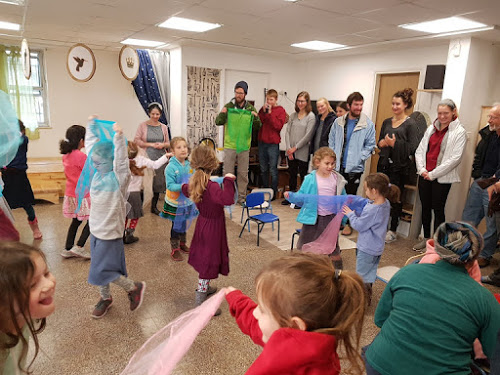 |
| Christian college students visit Efrat preschool. |
I have come to believe that the myriad lectures, PowerPoint presentations, video clips, websites, tweets, articles, books, etc., etc., etc. that tell the truth about Israel and the “Palestinians” don’t amount to a hill of beans in comparison to a positive and extended emotional experience. Such an experience requires the time not afforded by a lecture. In fact, I believe that a series of even great lectures, regardless of how outstanding the lecturer(s), is relatively ineffective at changing hearts and minds. The only thing that I am convinced can do this requires two key elements: (1) an intimate personal experience and (2) sufficient time. That is why “Shabbat in Efrat” is a 3-4 day program.
Things that the students are told on the first day but would reject out of hand as “Zionist settler” propaganda are towards the end of the program suddenly palatable and worth considering, possibly even true! This is especially the case when statements that conflict with their current beliefs about Israel, about Israeli “settlers,” about the “settlements” or “Palestinians” are uttered by members of their host family, and especially around the Shabbat table. The effect of this experience is almost miraculous and is reflected over and over again in the students’ written responses on the questionnaires they complete just prior to their departure. I have collected over 800 questionnaires from student participants.
Varda Epstein: What would you like first-time visitors to Israel to know?
Ardie Geldman: (1) The Middle East is not the Midwest, or: Dorothy, you’re not in Kansas, anymore. Many values here are different than those by which people live in Western countries. It is a conceit and counterproductive to try and understand political and social events and developments in this part of the world through a western lens.
(2) The Israeli-Palestinian conflict is not “good guys vs. bad guys.” It is far more complex and nuanced than they likely appreciate.
(3) Yes, to be honest, there are moral failures on both sides of the conflict; no nation state, no society is perfect. But there is no comparison between the quantity and enormity of such failures committed by the Palestinian side and those on the Israeli side. Unfortunately, there are examples of individual Israelis who have committed some unacceptable act of violence, and of course we never hear the end of these. But Israel is condemned most often for legitimate acts of self-defense. The Palestinian side, in contrast, is guilty of ongoing systematic and strategic acts of terror and violence. There IS a difference and that difference must be appreciated by anyone who wishes to understand the conflict.
(4) Finally, with regard to first time visitors, they need to be told that Palestinian spokespeople are masters of the tragic visage. They take people to sites and expose them to heartrending images. These are either presented out of context, such as (A) bringing visitors to the sordid living conditions of refugee camps and blaming Israel for their existence, while drawing their attention away from the mansions and expensive, late model cars situated just across the road, or (B) as outright lies, pointing out the water tanks on rooftops and telling visitors that Israel purposely denies the “Palestinians” sufficient amounts of water.
Varda Epstein: What’s the dumbest question you were ever asked about Israel and how do you answer that question?
Ardie Geldman: The dumbest, and also the most offensive question, uttered only a few times throughout the years is “How can Israel do to the Palestinians what the Nazis did to the Jews?”
Varda Epstein: What’s the question you’re asked most and how do you respond?
Ardie Geldman: Without a doubt, that question is: “Why did you choose to live in a settlement and not somewhere else in Israel?” And my answer is inevitably is “Because I agree with the Palestinians. There is no difference between Efrat and Tel-Aviv.”
Varda Epstein: What wisdom can you impart to us for dealing with people who are certain that Israel is an occupier oppressing its Arab minority? Do you have an elevator pitch for such people? A question that stops them in their tracks?
Ardie Geldman: That is exactly the point. In the case of such an emotionally fraught issue where the disinformation is so deeply ingrained there is no such thing as an effective elevator pitch. We have our facts; they have their facts. We have our anecdotes; they have their anecdotes.
The cognitive dissonance that is created when a conflicting opinion or idea is raised protects the “Palestinian” narrative like an Etrog. You just can’t get to it. The words, the facts, they just bounce off.
The only way to get past it, to break through, to penetrate it, is by way of a positive experience over time, meaning at least a few days. That is the lesson of iTalkIsrael. The “Palestinians” learned a long time ago that the way to a person’s brain is through their heart and NOT the other way around.You must change the heart before you can change the mind. That is true in many other areas of life and it is no less true here.
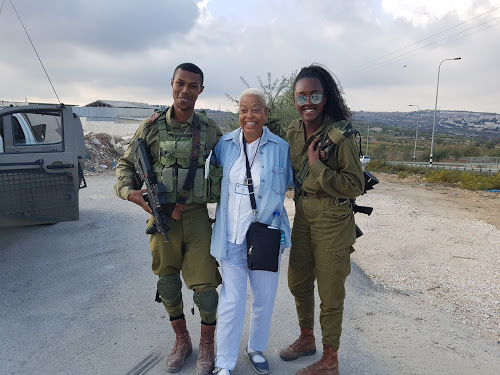 |
| “She had just said in our group discussion that Israel practices racism. Then we came across these two IDF soldiers on the group’s way back to the bus.” |
Varda Epstein: What’s next for you and italkIsrael?
Ardie Geldman: I have a “business plan,” if you will, to duplicate the iTalkIsrael experience in five other Jewish communities in Judea and Samaria. What we have been doing so successfully in Efrat for eight years, the Shabbat weekends, can and should be implemented elsewhere. Before the Corona pandemic we were hosting some 100-150 students in Efrat per year. The “Shabbat in Efrat” program has proven itself as a kind of beta plan. There is no reason why this can’t, within 2-3 years, grow to some 1,500 and more participants.
I would also like to create a training institute to teach others the advocacy principles and skills that I have acquired over the years. I have a huge, I would even say unique, library of materials waiting for this. All that is missing are the financial resources to put this in motion.
We have lots of ideas, but we need more resources to be even more effective. Please donate today to help get the message out and to help defend Israel.

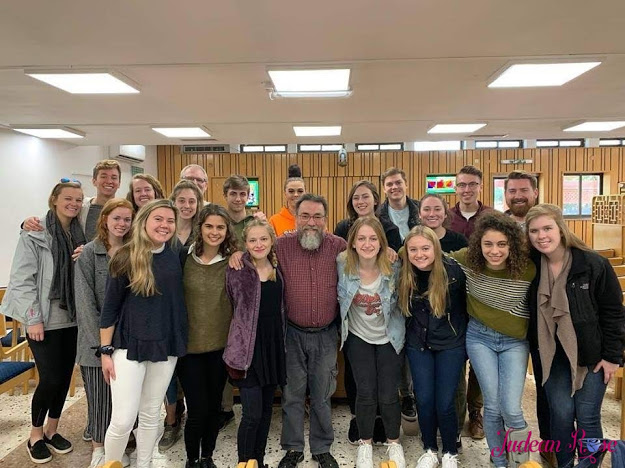
Leave a Reply